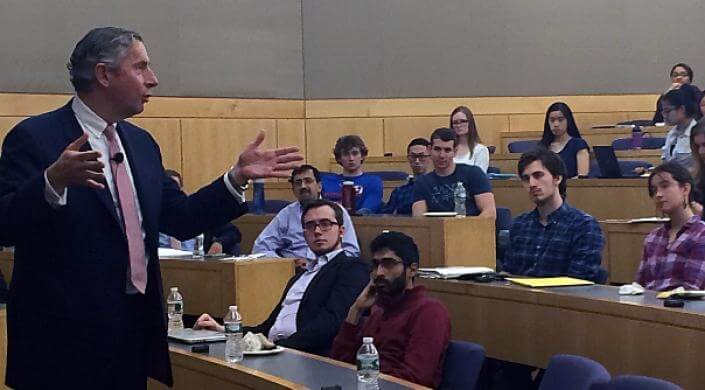News
During the SEAS Sophomore Forum, Alcoa CEO Klaus Kleinfeld told students that innovation is paramount. (Photo by Adam Zewe/SEAS Communications.)
How does a 128-year-old company stay relevant? It constantly innovates.
That was the key message Klaus-Christian Kleinfeld, chief executive officer of Alcoa, shared with Harvard John A. Paulson School of Engineering and Applied Science students during the culminating Sophomore Forum presentation on March 9. Alcoa, a Fortune 500 company with nearly $24 billion in annual revenue, is an international leader in lightweight metals and advanced manufacturing techniques.
“We know that we can make things today that our customers couldn’t even dream of. . .we are reinventing Alcoa pretty much every single day,” Kleinfeld told the students.
Rapid prototyping techniques, 3D manufacturing technologies, new coatings, and advanced metal alloys are driving dramatic changes in the materials industry. The strength of Alcoa’s project teams has enabled the firm to become a leader in innovation, Kleinfeld said.
As an example, he shared a recent company success story. Employing new software, 3D printing, and advanced manufacturing technologies, an Alcoa team created a functional prototype of a highly complex piece of jet engine equipment in only a few days, a process that typically takes 18 to 24 months.
“Collaboration is more important than ever,” Kleinfeld said during an interview. “Nobody’s perfect, but a team can be. To succeed, you have to put your best and brightest together into a high-performance team so they can challenge and inspire each other.”
He believes that teams of design-minded engineers will become increasingly important as firms revolutionize traditional manufacturing processes by incorporating fast computing, cheap sensing, and additional automation.
Recruiting top talent is among Alcoa’s chief priorities, especially as the historic firm separates into two companies, one focused on high performance products for the aeronautics, automotive, and other industries, and the other concentrating on “upstream” mining and refining. When recruiting engineers, Kleinfeld looks for candidates with breadth and depth, and said he specifically wants to see that an individual has the capability to be resilient in the face of frustration.
Just like Alcoa, engineering students (and prospective employees) should always be chasing new ideas and pursuing new opportunities, he said.
“If you stand still while the rest of the world is spinning, you’re going to be in trouble,” he said. “Standing still is sliding down. The trajectory is upward and it is moving. We want to run faster.”
Cutting-edge science delivered direct to your inbox.
Join the Harvard SEAS mailing list.
Press Contact
Adam Zewe | 617-496-5878 | azewe@seas.harvard.edu
